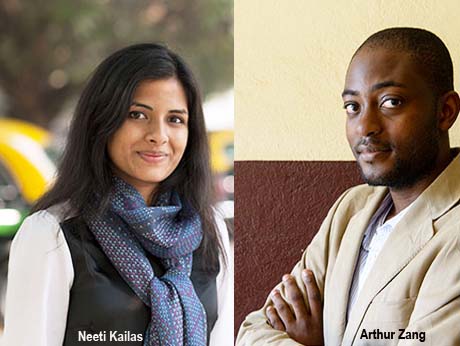
London, June 25 2014: Five young visionaries from Africa, India, Europe and the Middle East have been honoured with the 2014 Rolex Awards for Enterprise.
They include the inventor of arguably Africa's first medical tablet and an Indian whose inexpensive device is helping to screen babies for hearing loss.
The winners – aged 30 and under – were lauded for their ability to harness technology in an original way to improve the well-being of the community and the environment, as well as to advance scientific knowledge. They were chosen by an international Jury of eight eminent experts who reviewed a shortlist from among 1,800 applicants from all over the world. The laureates will each receive 50,000 Swiss francs to advance their projects.
The Winners are:
Neeti Kailas, 29, India – aims to vastly increase screening of newborn babies for hearing loss, through an inexpensive, easy-to-use device, and to set up an associated network of health-care professionals in India who can diagnose or treat deafness.
Olivier Nsengimana, 30, Rwanda – is promoting breeding programmes and the release of Rwanda’s captive, endangered grey crowned-cranes. The iconic bird, a symbol of wealth and longevity in Rwanda, is a victim of its own beauty, and is often kept as a pet.
Francesco Sauro, 29, Italy – is exploring the vast quartzite caves of South America’s fabled table- top mountains on the border of Venezuela and Brazil, making discoveries of unique worlds that have evolved in isolation over millennia.
Arthur Zang, 26, Cameroon – has invented what is believed to be Africa’s first medical tablet, which will allow health-care workers in rural areas to send the results of cardiac tests to heart specialists via a mobile-phone connection.
Hosam Zowawi, 29, Saudi Arabia – is developing rapid tests to detect the presence of antibiotic- resistant bacteria, now considered a global threat to human health. He also plans a regional public campaign warning of the dangers of the overuse and misuse of antibiotics
Said Rebecca Irvin, Head of Philanthropy at Rolex. “The five Young Laureates and their projects clearly demonstrate a strong spirit of enterprise and leadership. This year’s Jury was particularly impressed with the practical approach each is taking to solve real-world problems. They are certainly role models whose stories Rolex is pleased to bring to the world.”
The Rolex Awards for Enterprise were initiated in 1976 to commemorate the 50th anniversary of the Oyster chronometer, the world’s first waterproof watch and a symbol of the innovation that the Awards programme supports.
More detail on the India winner:
Neeti Kailas is the business strategy head of Bangalore-based Sohum Innovation Lab which has developed a unique device and system solution to do mass screening of newborns for hearing loss in resource-poor settings to prevent speech loss. Neeti is a graduate of the Master’s program at the Art centre College of Design and the INSEAD business school partnership program.Says Neeti: “To me, design is about problem solving, and thinking about how I can have maximum impact on society. In a country like India, that’s never going to happen by designing the next lemon squeezer.”
The need for hearing screening of newborns flows from immersive research in medical facilities in resource poor settings during the fellowship at Stanford India Biodesign of Neeti's husband and Sohum co founder Nitin Sisodia. They brought together a group of designers, physicians and business people motivated to bring positive change in the healthcare scenario in resource constrained setting.
How it works
Neeti's’s device works by measuring auditory brainstem response. Three electrodes are placed on the baby’s head to detect electrical responses generated by the brain’s auditory system when stimulated. If the brain does not respond to these aural stimuli, the child cannot hear. The device is battery-operated and non-invasive, which means babies do not need to be sedated, as some previous tests have required. Since the device is inexpensive and portable, it can be used anywhere.
“Another of the device’s major advantages over other testing systems is our patented, in-built algorithm that filters out ambient noise from the test signal. This was really important for us because, if you’ve ever been to health clinics in India, you’ll know how incredibly crowded and noisy they are,” says Neeti.
Over 500,000 babies a worldwide are born with hearing loss. One in five of them is born in India says a presentation by Sohum
We have a detailed story on Arthur Zang's CardioTab medical tablet here
Our Image of the Day carries more pictures of the winning technology from Neeti Kailas and Arthur Zang